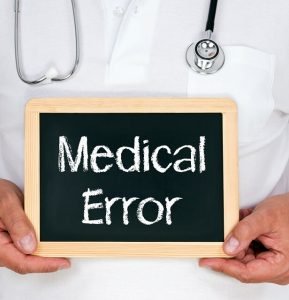
Free Consultation(203) 447-0000

Free Consultation(203) 447-0000
 Reducing the number of medical errors in the United States has become a critical issue in the medical profession. Since the release of the landmark study in 1999 by the Institute of Medicine, which concluded that preventable medical errors accounted for more than 98,000 patient deaths per year, medical professionals have strived to reduce such numbers. Medication errors, whether under-prescribing issues or side effects, have accounted for more than 7,000 of those deaths. Since the study’s release and increased awareness, has there been a decrease in the number of medical errors and associated deaths?
Reducing the number of medical errors in the United States has become a critical issue in the medical profession. Since the release of the landmark study in 1999 by the Institute of Medicine, which concluded that preventable medical errors accounted for more than 98,000 patient deaths per year, medical professionals have strived to reduce such numbers. Medication errors, whether under-prescribing issues or side effects, have accounted for more than 7,000 of those deaths. Since the study’s release and increased awareness, has there been a decrease in the number of medical errors and associated deaths?
The original study was released in 1999, but those researchers started pulling data as early as 1989. Since then, there has been an increase in production demands and costs, which often drives medical care more than the physician’s feelings. This has led to a theoretical increase in preventable adverse events (PAEs). In fact, more recent studies, which were comprised of four limited studies, found that there were an estimated 400,000 patient harm cases per year, and an estimated 210,000 preventable deaths associated with those harmful incidents.
The increase in PAEs across U.S. hospitals is due to:
The Office of the National Coordinator for Health Information Technology has been collecting information regarding Electronic Health Records (EHRs) and their effectiveness for reducing medical errors. During their research, they found that providers are relying heavily on the information provided to them in the EHRs. The survey also found that three times more physicians recognized that EHRs helped them avoid medication errors – a common cause of patient deaths in the United States. About 70 percent stated that lab and medication reminders or alerts also helped them prevent potential patient harm; 45 percent reported that specific features of EHRs alerted them to possible errors. EHRs also helped two times as many physicians correct lab tests.
One of the biggest reasons why EHRs are helping physicians provide a better standard of care is because they significantly improve patients’ and physicians’ understanding of a person’s health. Patients no longer have to recall every single medical history detail; instead, physicians can locate this pertinent information in the patient’s file.
While the technology has certainly helped reduce the number of errors seen in the medical industry, there are still thousands of injuries and deaths that occur each year – and they are preventable. If you have lost a loved one due to a preventable medical error, or you were injured due to your physician’s error, you may be entitled to compensation under a medical malpractice lawsuit. You will first need to consult with a Connecticut malpractice attorney. Contact Berkowitz and Hanna LLC today to schedule your no-obligation consultation. Call us at 866-479-7909 or contact us online to get started.
Berkowitz Hanna
